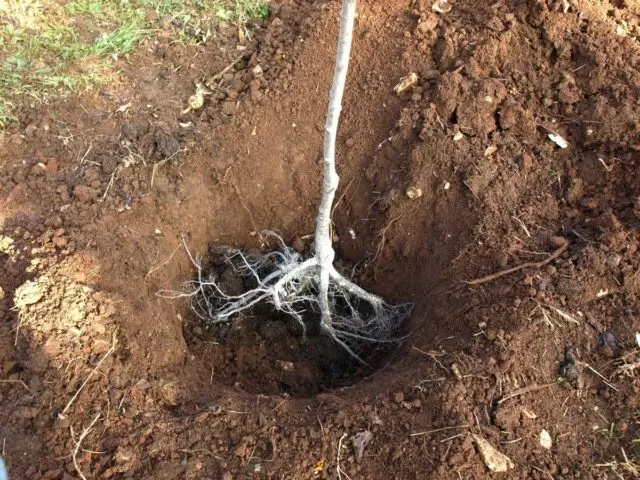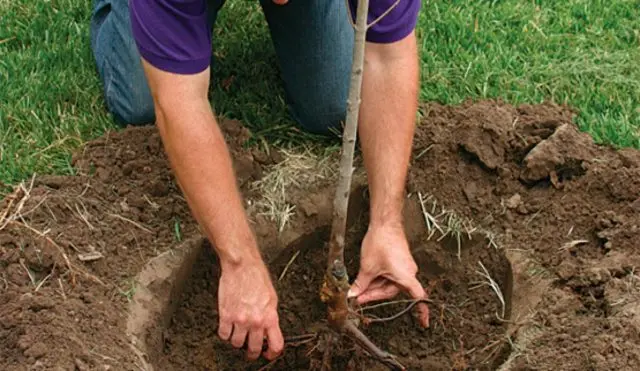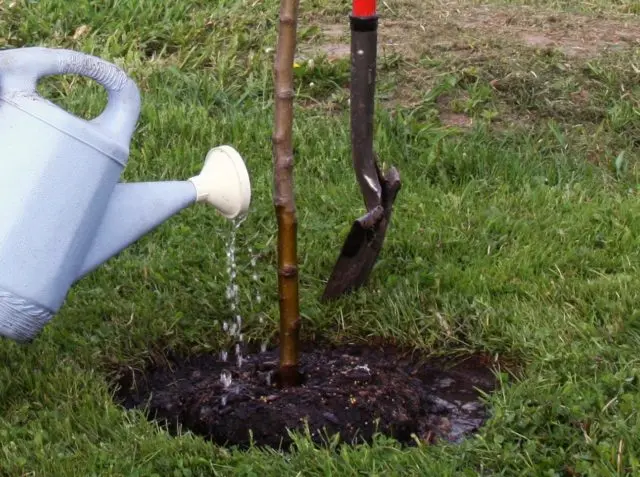Contents
The apple tree variety Firebird is especially popular with gardeners in the West Siberian region of the country. This is due to stable yields in difficult climatic conditions, increased resistance to diseases and unpretentious care. This species belongs to the category of semi-cultivators, that is, it combines the qualities of a wild Siberian apple tree and cultivated species. This feature explains the increased viability of the variety and stable fruiting in adverse conditions.
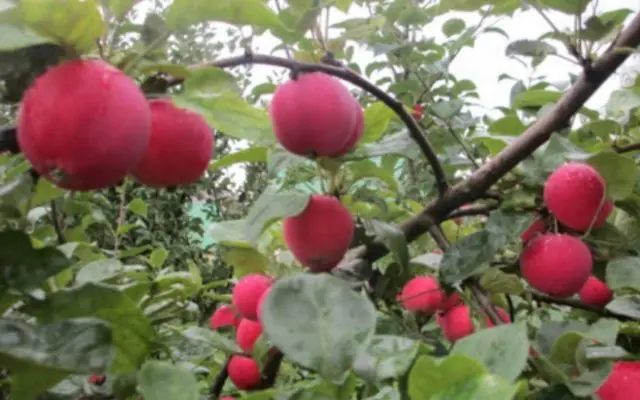
Firebird – summer type of culture
History of breeding
Work on the breeding of the Firebird apple tree was carried out by employees of the Siberian Institute of Horticulture. M.A. Lisavenko. This type of culture was obtained in 1963 on the basis of such varieties as Autumn Joy of Altai and Gornoaltayskoye.
The main characteristics of the Firebird were carefully studied for 14 years in the OPH “Barnaul”. The results obtained became the basis for registration of the official standard for this type of apple tree. And only in 1998, the Firebird was included in the State Register.
Characteristics of the apple tree Firebird
This variety has strengths and weaknesses, so choosing it, you need to study them. This will allow every gardener to understand how valuable this species is, and what difficulties can be encountered in growing it.
Appearance of fruit and tree
The Firebird forms a medium-sized compact tree, the branches of which are fixed at an acute angle. Its height is 3 m, which it reaches at the age of 7 years, and the diameter does not exceed 2,5 m. The crown of this apple tree is semicircular, not prone to thickening.
The branches are quite thick, but rarely located on the trunk. The Firebird apple tree bears fruit on ringlets of a simple and complex type. The color of the trunk bark and the main branches is gray-brown. Shoots of medium thickness, there is an edge on the surface.
The leaves are rounded, wrinkled, green, shiny. The plates are shortly pointed, curved down, with pubescence on the reverse side. There is a waviness along the edge. The petioles of this variety are of medium length. Stipules small, lanceolate.
The fruits of the variety are one-dimensional, small. On the surface there is a large smoothed ribbing. The average weight of apples is 35-50 g. The main color is yellow. The integument is bright red, blurred over the entire surface. The skin is smooth with a rich bluish bloom. Peduncle of medium length, pubescent. The pulp is juicy, has a fine-grained texture, medium density, creamy shade. Apples of the Firebird variety have a large number of subcutaneous dots of green color, which are clearly visible.
Life time
The productive age of the Firebird apple tree is 15 years. Lifespan is directly dependent on care. Subject to all the rules of agricultural technology, this indicator can be extended for 5 years, and if ignored, it can be shortened by the same period.
Taste
The taste of apples of the Firebird variety is sweet and sour, pleasant. The fruits contain a large amount of P-active components, vitamin C. Also, apples contain tannins and fruit sugars. But the concentration of pectin, titratable acids is quite insignificant.
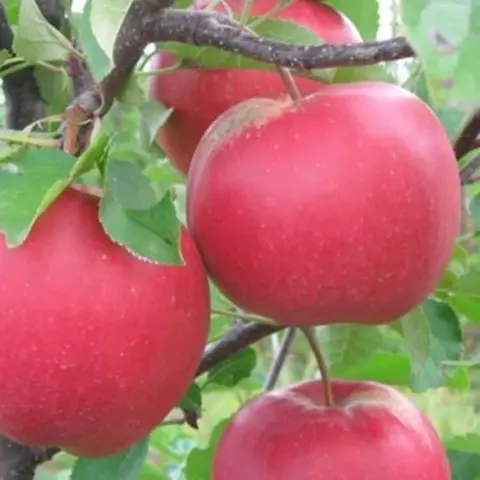
The fruits of this variety at an early stage of development are formed only on the lower branches.
Apple-tree Firebird of universal purpose, so the fruits can be eaten fresh, used for processing. When exposed to heat, the pulp retains its structure. Best of all, the variety is suitable for jam, juice.
Growing regions
The Firebird apple tree is recommended for cultivation in the Altai Territory. And also in such areas of the West Siberian region:
- Kemerovo;
- Tomsk;
- Novosibirsk;
- Omsk;
- Tyumen.
In addition, the variety can also be grown in the middle lane. The Firebird apple tree shows good productivity in conditions of short summers, sharp temperature changes and cool springs, so it is not suitable for growing in the southern regions.
Productivity
The fruiting of the Firebird apple tree occurs annually with enviable stability. The yield of a tree up to 10 years old is about 20,1 kg, and with each subsequent year this figure increases and reaches 15 kg by the age of 45.
Frost resistance
The Firebird apple tree has an average level of frost resistance. But when the temperature drops to -40 degrees, the bark freezes slightly. These signs are visible. In this case, the tree does not die, but the recovery process lasts 1 year.
Disease and pest resistance
Due to the fact that the Firebird apple tree is obtained on the basis of wild Siberian, it shows high resistance to diseases and pests. But, in order to exclude the possibility of damage if the growing conditions do not meet, it is necessary to carry out preventive treatments of the tree.
Flowering period and ripening period
This variety begins to fully bear fruit for 5 years after planting. In terms of fruit ripening, the Firebird belongs to summer species. The tree blooms annually in late spring-early summer, when the temperature is confidently kept at around +15 degrees. The duration of the period is 6-10 days.
Removable maturity at the Firebird occurs in the 20th of August, so the harvest can be carried out over the next 2 weeks.
Pollinators
This variety of apple trees is among the self-infertile. Therefore, when landing, you need to take this into account. For a stable fruit set, he needs the following pollinator varieties:
- Gift for gardeners;
- Altai ruddy;
- Cherished.
Transportation and storage
Since the Firebird is a summer variety, apples are not suitable for long-term storage. The maximum shelf life of fruits is 1 month at a temperature not higher than +15 degrees. In the future, the pulp becomes dry and friable, and also loses its taste.
It is possible to transport the harvest of this variety only at the stage of technical maturity, so as not to spoil the presentation of apples.
Advantages and disadvantages
The Firebird apple tree has clear advantages and disadvantages compared to other varieties of culture. Therefore, when choosing this variety, you need to pay attention to them.
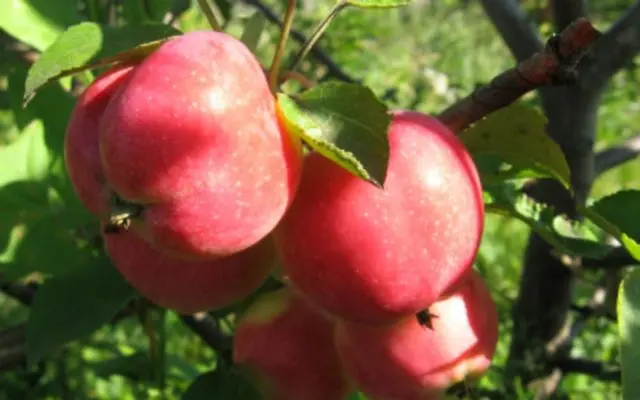
Some gardeners note that the Firebird is suitable for making wine.
The main advantages:
- good taste of fruits;
- high resistance to scab, pests;
- simultaneous return of apples;
- stable yield;
- attractive fruit appearance;
- resistance to adverse climatic conditions.
Disadvantages:
- average frost resistance, as for semi-cultures;
- short period of storage of apples;
- small size of fruits;
- fast maturation on the tree.
Landing
In order for the Firebird apple tree to fully develop in the future, it is necessary to properly plant. This should be done in the spring, after the temperature rises above + 5- + 7 degrees and the soil thaws. You need to place the tree on the south or east side of the site, protected from drafts. The groundwater level must be at least 2,0 m.
In the spring, 2 weeks before planting, you need to dig a hole 80 cm deep and 60 cm wide. Fill it with a mixture of turf, humus and peat, taking the components in a ratio of 2: 1: 1. And additionally add 200 g of wood ash, 30 g of superphosphate and 15 g of potassium sulfide, mix thoroughly.
Landing algorithm:
- Make a hill in the center of the landing pit.
- Spread the roots of the seedling, if necessary, cut off the damaged areas.

- Put it on a dais, next to install a support at a distance of 20-30 cm from the root.
- Sprinkle with earth so that the root neck is 2-3 cm above the soil level.

- Compact the soil from above at the base of the seedling.
- Liberally pour.

- Tie the seedling with twine to the support.
Cultivation and care
To grow an apple tree, you need to provide the tree with comprehensive care. It includes regular watering as needed throughout the first year after planting. You need to do this 2 times a week. Then it is necessary to loosen the soil in the root circle in order to improve air access to the roots.
Also, in a particularly hot period, mulch from humus or mowed grass should be used. This measure will prevent overheating of the roots and retain moisture in the soil.
In the future, every spring it is necessary to carry out preventive treatment of the tree. To do this, dissolve 700 g of urea, 50 g of copper sulfate.
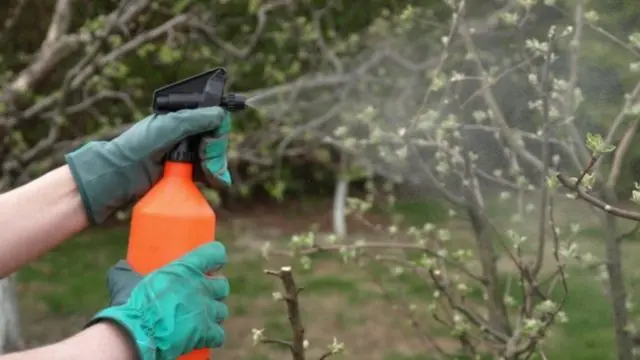
Timely spraying of the crown helps to avoid many problems.
Feeding seedlings should begin at the age of three. To do this, add 35 g of superphosphate, 15 g of potassium sulfate, 35 g of ammonium nitrate to the root circle in the spring, with further incorporation into the topsoil. With abundant fruiting, it is necessary to use organic matter. With the advent of spring, it is necessary to prune broken and damaged shoots annually.
Collection and storage
It is necessary to harvest the Firebird during the technical maturity of apples, since when they are fully ripe, they begin to fall off. It is necessary to put the fruits in wooden boxes, shifting them with straw. For long-term storage, a temperature of +15 degrees should be provided.
Conclusion
The Firebird apple variety is ideal for regions with harsh climatic conditions, as it easily tolerates temperature changes and at the same time shows stable fruiting. At the same time, the culture does not require specific care, so any novice gardener can grow this tree on the site.










